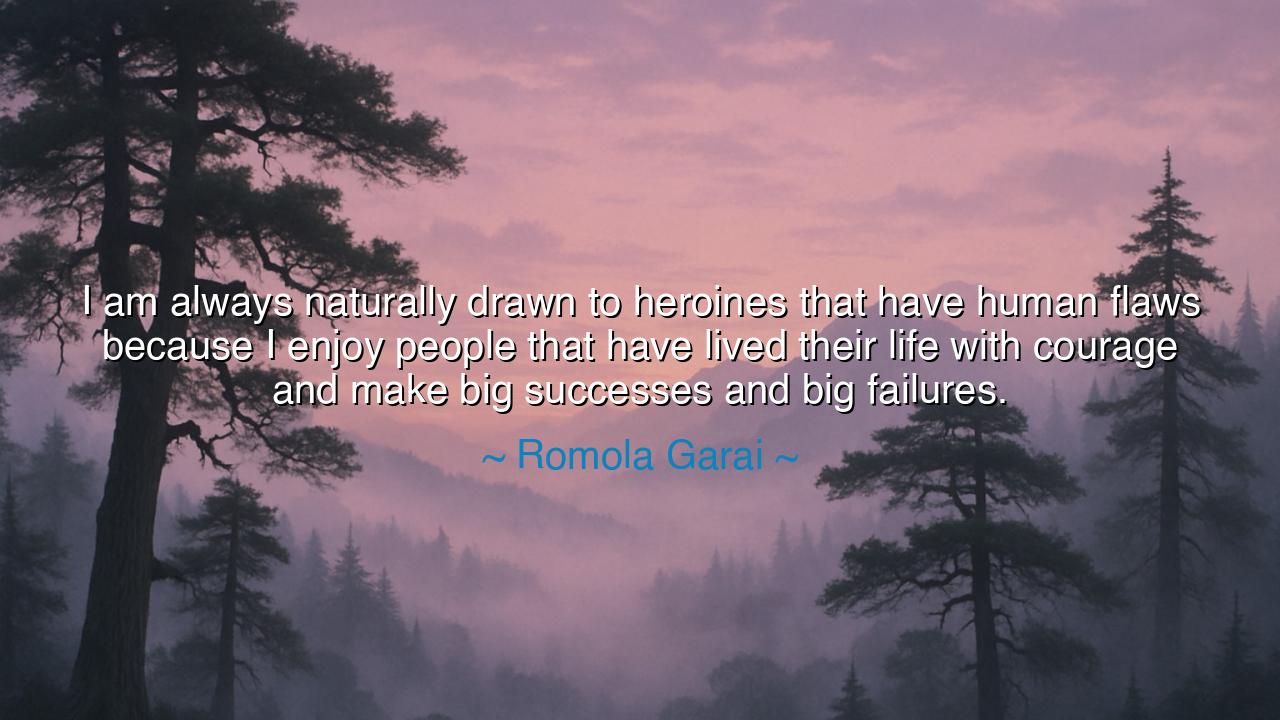
I am always naturally drawn to heroines that have human flaws
I am always naturally drawn to heroines that have human flaws because I enjoy people that have lived their life with courage and make big successes and big failures.






“I am always naturally drawn to heroines that have human flaws because I enjoy people that have lived their life with courage and make big successes and big failures.” — Romola Garai
In these perceptive and soulful words, Romola Garai, the English actress and storyteller, reveals a truth that transcends both art and life — that perfection does not inspire; humanity does. She speaks not of flawless heroines sculpted from marble, but of living souls made of fire and fragility, who dare greatly, stumble deeply, and rise again. Such characters — and such people — remind us that courage is not the absence of failure but the willingness to meet it face-to-face. Garai’s reflection is not merely about her craft; it is a meditation on what it means to live — to embrace the full measure of experience, both its triumphs and its heartbreaks.
The origin of her words lies in her career and her artistic choices. Romola Garai has long been known for portraying complex women — heroines who are bold, intelligent, and flawed. Whether in Atonement, Emma, or The Crimson Petal and the White, she gravitates toward roles that reflect truth rather than fantasy. Through her, we see the essence of the human struggle — the desire to do good, the weight of mistakes, and the resilience to begin anew. Her affection for such women is rooted in reverence: she admires not their success, but their courage to live fully, to risk greatness knowing that failure may follow.
The ancients, too, revered the imperfect hero. In the myths of old, it was not the unblemished who taught humanity wisdom, but those who faltered and rose again. Odysseus, cunning and proud, wandered for years, tested by gods and fate. Achilles, mighty in battle, was undone by his own rage. Antigone, driven by moral conviction, defied the king and met her end with dignity. Their stories endure not because they were divine, but because they were human — flawed, passionate, courageous. Garai’s insight joins this lineage of wisdom: that the beauty of the hero’s journey lies not in victory, but in vulnerability.
In our own age, we are often taught to hide our failures, to polish our image until no imperfection remains. Yet, as Garai reminds us, it is those who dare to live without fear of failure who change the world. Courage, she says, is the bridge between success and failure — it is the force that drives one to risk the heart for the sake of meaning. To live with courage is to accept that both triumph and loss are sacred teachers. The person who never fails has never dared enough to grow. The person who never stumbles has never climbed. Thus, it is the flawed — the ones who bear their scars openly — who carry the deepest wisdom of life.
Consider Amelia Earhart, the aviator who crossed oceans with wings of hope and willpower. She did not seek perfection; she sought flight. Her courage led her to achieve what no woman before her had done — yet it also led her into the unknown, where she vanished forever. But even in her disappearance, she became immortal — not for her success alone, but for her willingness to risk everything for her dream. Like Garai’s heroines, she lived largely, courageously, vulnerably — and it was in that fullness that her greatness was born.
To be drawn to human flaws is to love truth. It is to see beauty not in the absence of weakness, but in the struggle to rise above it. A flawless life is not a life well-lived — it is a life untested. The heroes and heroines who inspire us are those who stumble and bleed, yet continue the climb, their eyes fixed on something higher. Their strength lies not in perfection, but in perseverance. And so, as Garai suggests, the soul that dares to experience both the glory of success and the pain of failure is the soul most fully alive.
Let this, then, be the teaching: Live with courage. Do not fear the cracks in your story, for they let the light through. Do not seek perfection, for it is an illusion that drains the spirit. Seek instead authenticity — the fierce honesty to live your life boldly, to love deeply, to fail magnificently, and to rise again with greater wisdom. For, as Romola Garai reminds us, it is not the unbroken who inspire us, but the brave — those who have lived greatly, loved fiercely, fallen deeply, and still dared to stand again. In their courage, we glimpse the true grandeur of being human.






AAdministratorAdministrator
Welcome, honored guests. Please leave a comment, we will respond soon